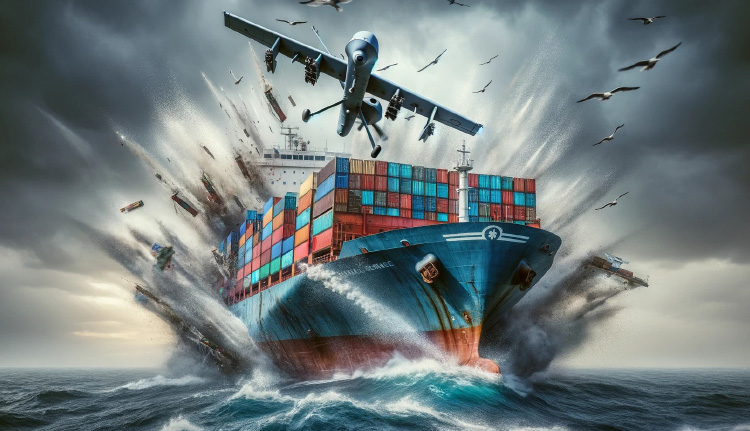As Israel’s war on Gaza pushes on, fears of regional escalation are growing, with multiple nations and armed groups targeting each other’s territories and common waters, and the United States boosting its military assets in the region.
The escalation in the Gaza conflict has triggered a ripple effect of violence far beyond its borders. While the world watched in horror as Israeli airstrikes leveled Gaza, news about attacks and casualties linked to the conflict came from Lebanon, Syria, and Iraq.
However, another battlefront that emerged in the Red Sea is threatening the lifeblood of global trade. The Houthis, a Yemeni rebel group aligned with Iran, have declared war on Israel, deploying a devastating new tactic: targeting commercial shipping in one of the world’s most crucial waterways.
The Red Sea, a narrow artery connecting Europe to Asia and East Africa, sees a daily flow of vital goods. At its southern tip lies the Bab el-Mandeb strait, a chokepoint barely 20 miles wide that serves as the gateway to the Suez Canal and beyond. This strategic bottleneck has become the Houthis’ hunting ground.
Initially targeting vessels flagged for Israel, the Houthis have steadily broadened their scope, attacking ships from countries supporting Israel, which puts US and British ships, for example, under real threat.
The consequences are dire. US and British forces have retaliated with airstrikes, but experts fear the Houthis’ resolve will hold. Their experience weathering five years of Saudi-led airstrikes suggests they are prepared for a long game of disruption supported by Iran’s weaponry and their fortified geographical location.
This disruption in one of the most important waterways has global repercussions. The pandemic’s port logjams and the Ukraine war have already strained supply chains and the Houthi attacks are another blow that can add insult to injury. According to Fitch estimates, prolonged conflict could see global goods inflation climb by 2%, adding fuel to the fire of rising prices.
The oil market is particularly vulnerable. While alternative routes around Africa exist, they add precious days to journeys, tightening supply and potentially driving up prices. Disruption to the Strait of Hormuz, another key oil artery, could have even more dramatic consequences.
The Red Sea is a critical route for oil shipments, accounting for about 12% of global oil seaborne trade. The attacks in the Bab el-Mandeb strait have primarily impacted oil shipments bound for Europe and Asia. Some major oil companies, including BP, Shell, and QatarEnergy, have halted transit through the Suez Canal, forcing shippers to reroute around Africa. This temporary adjustment may slightly tighten the oil and gas markets, but it is not anticipated to have a significant impact on prices.
The domino effect can extend beyond oil. European chemical markets, already weakened by the economic slowdown, face further strain from delayed Red Sea shipments. Fertiliser exports, though largely unaffected by attacks so far, face higher freight costs, squeezing profits and potentially impacting food security.
News reports have already talked about idled car factories in Belgium and Germany while Spring fashion lines are delayed at a popular British department store due to Houthi attacks. Many companies around the world declared that they don’t know when to expect parts from Asia.
One day after the United States and the United Kingdom, with the support of other countries, launched airstrikes across multiple parts of Yemen in response to Houthis attacks on vessels, UN Secretary-General António Guterres has urged countries to avoid an escalation in the situation in the Red Sea.
As the Secretary-General reiterates that attacks against international shipping in the Red Sea area are not acceptable, he stresses the need to avoid acts that could further worsen the situation in Yemen itself.
Many other countries adopted a similar stance including China, which called for an end to the harassment of civilian vessels to safeguard unimpeded global industrial and supply chains and international trade order.
However, Beijing noted at the same time that the UN Security Council has never authorized any country to use force against Yemen, adding that it is necessary to refrain from taking any actions that will “add fuel to the fire” in the Red Sea and raise the overall security risks in the region.
Russia, in the meantime, condemned the United States and Britain for their military strikes on Yemen, which Moscow said amounted to an irresponsible adventure that risked sowing chaos across the entire Middle East.
Russia said it shared the concerns of Saudi Arabia and others in the region over the strikes. Riyadh called for restraint and “avoiding escalation” after the strikes and said it was monitoring the situation with great concern.
The Houthi attacks, born from the ashes of the Gaza conflict, are a stark reminder of the interconnectedness of our world. A seemingly distant war can have devastating consequences for lives and economies far beyond the battlefield. As the conflict drags on, the question remains: can the international community find a path to de-escalation before the Red Sea becomes a graveyard of global trade? The answer is offered by the Houthis themselves; stop the Israeli aggression on Gaza.







